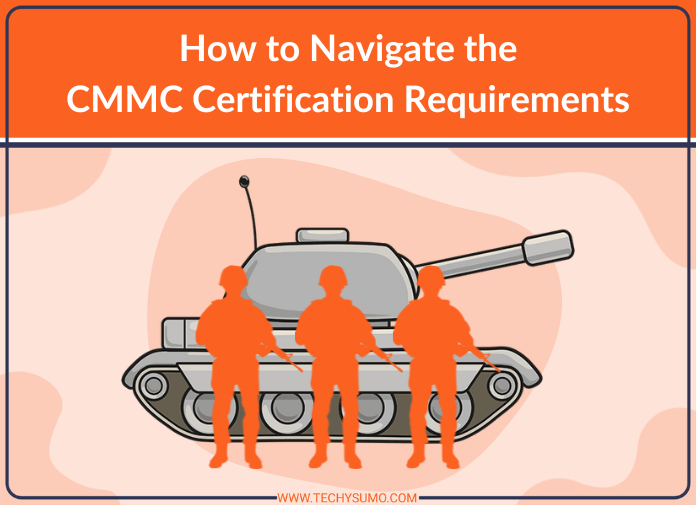The United States is the world’s biggest defense spender. That shouldn’t come as a surprise for a nation with over 120 foreign military bases spread across 50+ countries.
Perhaps the more jaw-dropping bit is the sheer amount allocated towards defense spending annually.
In 2024, the US spent a whopping $997 billion on defense. The figures translated to 37 percent of the global military spending that year, and exceeded the total defense budgets of the next nine countries combined.
With such a huge budget, it’s unsurprising that the Department of Defense (DoD) regularly advertises lucrative tenders. However, the agency imposes stringent eligibility criteria for aspiring vendors.
Possessing a CMMC certification is a minimum condition for successfully bidding on DoD contracts. Besides, complying with the program’s requirements can provide critical business and cybersecurity advantages. However, obtaining CMMC certification can be daunting for first-timers. To help you expedite the process, we’ve put together the top tips on navigating various compliance challenges.
Table of Contents
Also Read
Unpacking CMMC
The Cybersecurity Maturity Model Certification, more commonly abbreviated as CMMC, is a program developed by the US Department of Defense to ensure defense suppliers adhere to specific cybersecurity protocols for safeguarding sensitive information.
CMMC was designed to fend off evolving cybersecurity threats targeting the Defense Industrial Base (DIB).
Recently, the DoD has been the victim of aggressive cyberattacks targeting its critical infrastructures. A noteworthy incident was the SolarWinds cyberattack in 2020, which caused massive exfiltration of sensitive data from various federal agencies.
CMMC exists primarily to strengthen the DoD’s supply chain. However, obtaining CMMC certification may confer additional benefits, including qualifying your business for DoD tenders.
CMMC Assessment versus Certification
Although commonly used interchangeably, “CMMC assessment” and “CMMC certification” aren’t exactly similar.
Assessments are processes that entail evaluating a vendor’s compliance with CMMC’s cybersecurity requirements.
The CMMC framework has three maturity levels. Level 1 organizations can self-audit, while independent agencies must spearhead assessments under the subsequent levels.
Meanwhile, CMMC certification is the formal recognition of CMMC compliance. It involves issuing an organization with relevant credentials as proof of meeting the minimum controls under its maturity level.
How to Manage CMMC Certification Requirements
1. Understand the Targeted Information
CMMC targets two types of sensitive information – Federal Contract Information (FCI) and Controlled Unclassified Information (CUI).
FCI encompasses information generated during defense contracts, which isn’t intended for public consumption. Examples include sketches of defense installations.
CUI, on the other hand, is sensitive information that may be released to the general public. Examples are social security numbers (SSNs) and consumer complaint records.
While both FCI and CUI must be handled discreetly, CUI requires additional security measures due to its potential for slipping into unintended hands.
2. Determine Which Information Applies To Your Organization
To determine which type of sensitive information applies to your company, you’ll need to familiarize yourself with the three CMMC maturity levels.
CMMC Level 1 only applies to Federal Contract Information. Defense contractors that handle FCI must self-assess annually and affirm their compliance with 17 foundational practices based on FAR 52.204-21’s 15 cybersecurity controls.
Most organizations that handle both FCI and CUI fall under CMMC Level 2. The DoD requires businesses seeking Level 2 certification to fulfill at least 88 of 110 controls aligned with the National Institute of Standards and Technology (NIST) Special Publication (SP) 800-171. Besides, assessments must be conducted triennially and led by independent agencies known as third-party assessor organizations (C3PAOs).
CMMC Level 3 also targets defense vendors that handle FCI and CUI. However, it differs from Level 2 in that it seeks to guard against advanced persistent threats (APTs).
To obtain Level 3 CMMC compliance certification, a business must schedule triennial assessments spearheaded by a Defense Industrial Base Cybersecurity Assessment Center (DIBCAC)-appointed cyber auditor.

3. Conduct Preliminary Assessments
Failing CMMC assessments can derail your certification goals significantly.
But rather than wait for a third-party auditor to identify gaps in your current cybersecurity framework, you could uncover these weaknesses and seal them ahead of official assessments.
Scope out your organization’s data storage systems to pinpoint the assets where FCI and/or CUI is stored. Then, determine whether such information is handled in line with CMMC’s cybersecurity requirements under your respective maturity level.
Document all weaknesses uncovered during the audit process. Finally, remediate the threats and update your cybersecurity documents accordingly.
4. Managing Certification Costs
CMMC certification costs vary primarily by maturity levels, ranging from as low as $1,000 to over $500,000.
Certification costs also depend on an organization’s size. Other considerations include the number of preliminary assessments and annual affirmations required, threat remediation efforts, and risk assessment interventions.
Fortunately, you can implement specific strategies to manage CMMC certification costs. Examples include;
- Self-auditing and remediating gaps before official assessments
- Leveraging pre-made policy documents
- Prioritizing high-risk threats
- Choosing assessors who are familiar with your technology stack
- Budgeting for operational downtimes during audits to avoid revenue losses
- Scheduling audits during low business seasons

Seizing a Competitive Edge Through CMMC Certification
Obtaining CMMC certification is a strategic achievement for aspiring and existing defense contractors. Besides helping to thwart cybersecurity threats along the DIB supply chain, possessing a valid CMMC certification also enhances your eligibility for lucrative DoD tenders.
Moreover, duly certified organizations are able to keep track of their cyber hygiene and prevent reputational damage caused by cyberattacks.
Implementing these pointers can be critical in bypassing the common pitfalls encountered on the road to CMMC compliance.






